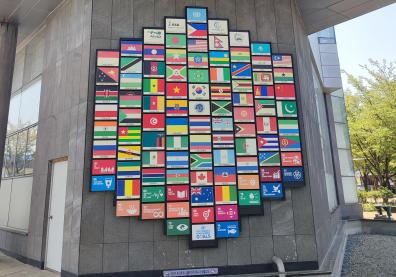Educational mobiliy : international students in South Korea and China

Chair : Oumrati Mohamed (PhD Candidate in Political Science (Inalco/Sciences Po)
Discutant : Kevin Mary ( Maître de conférences en géographie, Université de Perpignan Via Domitia)
Hyunjee Kim (PhD student at the Centre Population et Développement (CEPED) of the French National Research Institute for Sustainable Development (IRD) and Paris Cité University.
Title : Elite Mobility from Sub-Saharan Africa to Korea: A New Institutionalized Pathway for Korea’s Ontological Security
Abstract : The educational mobility of Africans to Korea is a significant channel fostering relations between the two regions, yet it is rarely addressed as an independent topic in the literature. Meanwhile, Korea’s approaches to Africa have primarily been examined through the lens of Korea’s dual, and sometimes conflicting, economic and (geo)political interests (Darracq, V. and Neville, D., 2014; Kim, S. and Gray, K., 2016; Kim, S., 2013; Nicolas, F., 2020). Although there is consensus on the presence of non-economic motivations behind Korea’s strategies towards Africa, these have often been oversimplified as “soft power.” In this presentation, I will discuss the mobility of African students to Korea as a strategic tool to address its complex non-economic needs, which cannot be fully captured through the concept of soft power. Scholarship programs channeling African elites to Korea will be examined, alongside Korean discourse towards Africa and African students, drawn from interviews, official documents, and grey literature since the 1960s. In doing so, I will seek to explore how Korea’s identity, needs, and representation of Africa are redefined as the geoeconomic landscape changes, leading to the emergence of new institutionalized student mobility channels. Then I will examine how these mechanisms of mobility are utilized to ensure Korea’s ontological security.
DU, Yingjing (Ph.D. student at Graduate School of Asia-Pacific Studies, Waseda University, Tokyo, Japan)
Title : China’s Internationalization of Higher Education and Inbound International Student Mobility from the Belt and Road
Abstract : The geography of international student mobility (ISM) is transforming, with a rapid increase of students and multipolarity-shifting destinations. The U.S. and the U.K. maintain the top two destinations, while China has moved up to third place, hosting 492,185 international students. This is facilitated by government policy, such as the Belt and Road Initiative (BRI). The students from BRI countries comprise 53% (260,600), maintaining a high growth rate (12.8%) which surpassed the average increase rate of students from other regions (6.7%). This paper investigates China’s inbound international students from the BRI countries. Through policy document analysis and semi-structured qualitative interviews with 50 students from BRI, this paper explores the student decision-making in choosing to study in China and their post-graduation trajectories. Findings suggest that the migration infrastructure contributes to the increase of China’s inbound ISM, including regulatory (government scholarships and institutional cooperation), commercial (study abroad agencies), technological (word of mouth on social media), and social (networks of students) dimensions. This paper also finds that China’s internationalization of higher education is mainly driven by top-down initiatives, fulfilling the purpose of introducing foreign talents in an aging and birthrate-declining society. However, the post-graduation trajectories of students show that they have become transient migrants — neither wanting to go back nor being able to move forward to a better country.